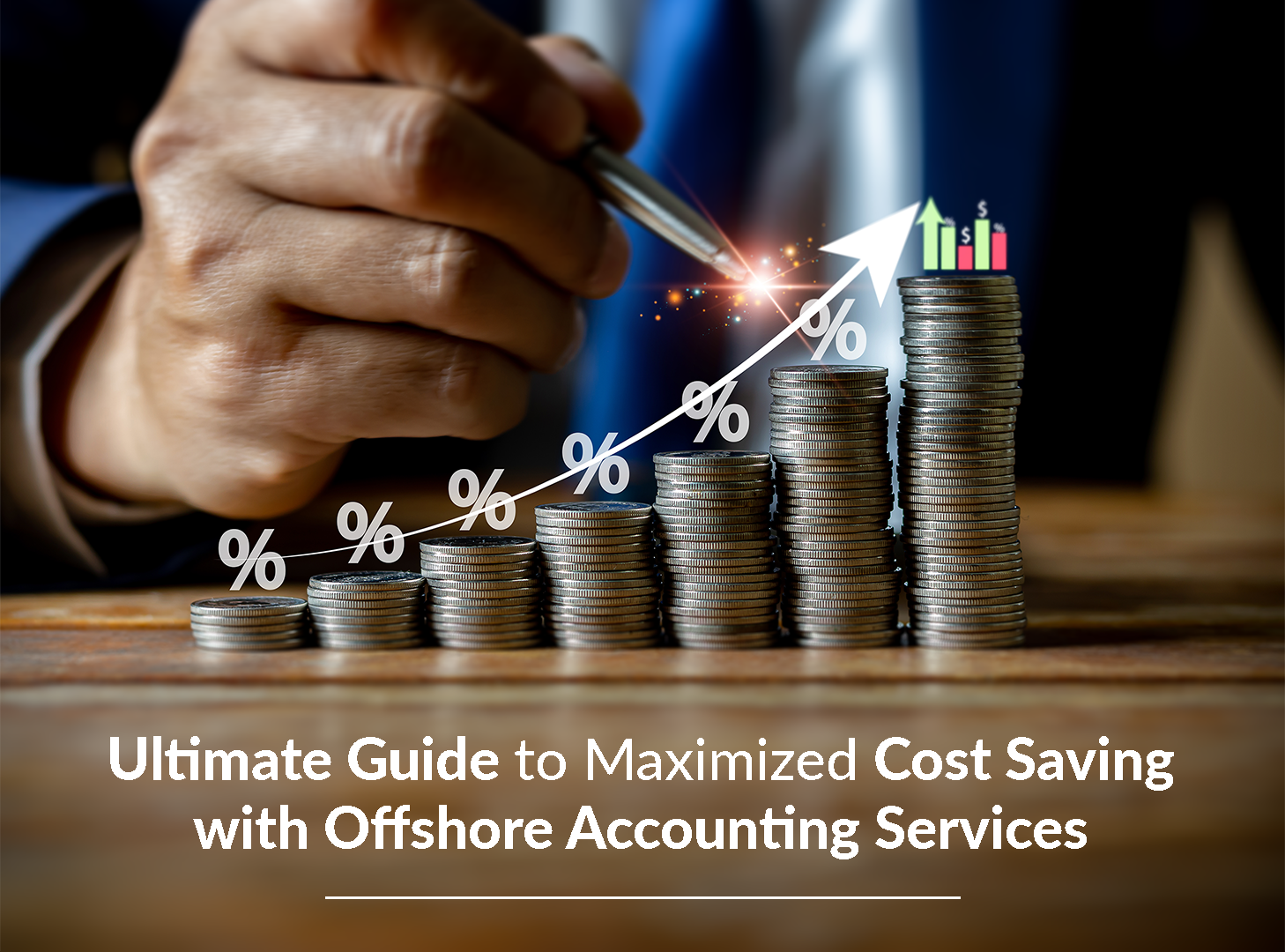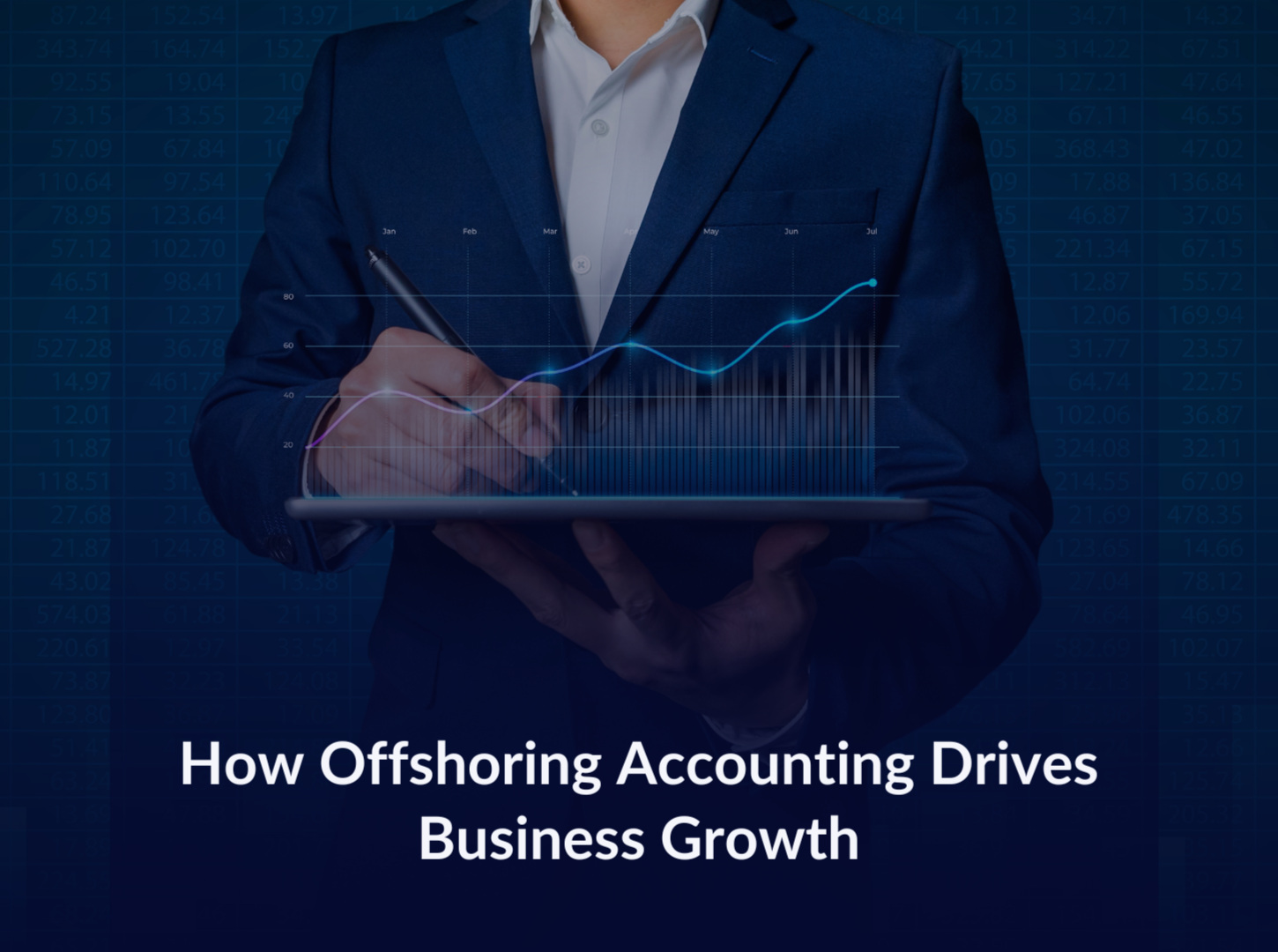In today’s competitive business landscape, effective cost control is more crucial than ever. Companies across all industries are constantly searching for strategies to not only survive but thrive by reducing expenses and enhancing efficiency. In this quest for financial optimization, offshore accounting has emerged as a powerful tool.
Offshore accounting involves delegating various financial tasks—from basic bookkeeping to complex financial analysis—to teams in countries with lower labor costs. This strategic move not only cuts down on expenses but also leverages global talent, allowing businesses to focus on core activities and strategic growth.
As we dive deeper into this blog, we’ll explore how offshore accounting can be a key component of your cost saving strategy, ensuring that your business remains robust and competitive in a demanding market environment!
Understanding Offshore Accounting
When you hear about offshore accounting, you might wonder what it exactly involves. Simply put, offshore accounting refers to the practice of outsourcing financial tasks to professionals in countries other than where your company is based.
Key Financial Areas Impacted by Offshore accounting
Offshore accounting can touch on several crucial financial operations within your business:
- Offshoring Accounts Payable (AP): This involves managing outgoing payments and ensuring that all vendor invoices are processed efficiently. Offshoring these task helps streamline expenses and improve cash flow management.
- Offshoring Accounts Receivable (AR): Conversely, this area focuses on incoming payments. Ensuring that your customers pay their invoices on time is critical for maintaining liquidity. Offshore professionals can manage these processes, from billing to collections, making it faster and more efficient.
- Offshoring Order-to-Cash (O2C): This end-to-end process is all about converting your sales into actual revenue. It covers order management, billing, and collections. Offshoring these tasks can speed up the process and improve your cash position.
- Offshoring Procure-to-Pay (P2P): From purchasing to payment, this process oversees acquiring goods and services and paying for them. Outsourcing these tasks can enhance compliance and negotiation outcomes, as well as save on operational costs.
- Offshoring Financial Planning & Analysis (FP&A): This crucial area involves budgeting, forecasting, and supporting business strategy with solid financial insights. Offshore experts in FP&A can provide valuable analyses at a lower cost, aiding your strategic decisions.
By offshoring these key areas, you can not only cut costs but also streamline operations, enabling your business to function more effectively and compete at a higher level.
Cost Saving Strategies
A. Target the Right Tasks for Offshoring
To maximize your savings with offshore accounting services, the first step is to identify which tasks within your financial operations should be outsourced. The key is to pinpoint high-volume tasks that can be automated or standardized, allowing offshore teams to handle them more efficiently than in-house staff.
- Accounts Payable (AP): For AP, consider outsourcing repetitive tasks such as invoice data entry, payment processing, and handling of payment-related inquiries. These are time-consuming activities that can be managed more cost-effectively by offshore specialists.
- Accounts Receivable (AR): In AR, tasks well-suited for offshoring include dispatching invoices, preparing and sending customer statements, and managing debt collection. These processes often follow standard procedures, making them ideal for remote handling.
- Order-to-Cash (O2C): The O2C cycle can benefit from offshoring tasks like order processing, conducting credit checks, and generating sales reports. These are critical yet standardized tasks that can be efficiently scaled and managed offshore.
- Procure-to-Pay (P2P): For P2P, outsourcing can efficiently cover the issuance of purchase orders, managing vendor communications, and processing expense reports. Each of these tasks involves considerable paperwork and process management, which can be handled at a lower cost by skilled offshore teams.
By carefully selecting tasks that are high in volume and suitable for automation, you can leverage offshore capabilities to not only reduce costs but also enhance operational efficiency, making your financial processes leaner and more dynamic.
B. Right-Size Your Team
Optimizing your team size through offshore accounting involves a strategic incremental outsourcing approach. Start small by outsourcing low-risk tasks, and as you gain confidence in the process and see tangible benefits, you can gradually increase the scope of outsourced work. This method allows you to adjust smoothly without overwhelming your in-house team or sacrificing quality.
- Benefits of Gradual Integration: Gradually integrating offshore services helps mitigate risks associated with handing over control of your financial processes. It also allows your onshore and offshore teams to adapt to each other’s workflows, fostering a collaborative environment that leverages the strengths of both teams.
C. Negotiate Service Packages
When entering into agreements with offshore accounting firms, it’s crucial to negotiate customized service packages that align with your specific needs.
- Customized Service Package Negotiation Strategies: Aim to create a flexible service agreement that allows for adjustments based on performance and changing business needs. Ensure that the services offered can be scaled up or down and include performance metrics and clauses that allow for periodic reviews and revisions.
- Balancing In-House Tasks with Outsourced Responsibilities: While negotiating, consider which tasks are strategic or sensitive and should be kept in-house, and which operational tasks can be safely outsourced without losing control over critical financial operations. This balance is essential for maintaining integrity in your financial processes and ensuring that your business objectives are met efficiently.
By adopting these strategies, you can develop a more tailored, efficient, and scalable offshore team that complements your existing resources while maximizing cost efficiencies.
D. Leverage Technology
Incorporating advanced technology is key to maximizing the efficiency of your offshore accounting services.
- Automation and Cloud-Based Solutions: Implement automation technologies and cloud-based accounting solutions to streamline operations. These tools can reduce manual errors and enhance processing speed, making tasks like invoice management and financial reporting more efficient. Automation ensures consistency and accuracy in your financial transactions, which is vital for maintaining compliance and reliability.
- Importance of Technology in Collaboration: Utilizing technology is also crucial for facilitating real-time collaboration between your in-house and offshore teams. Cloud platforms can dramatically reduce infrastructure costs by eliminating the need for physical servers and other hardware, while also enabling instant updates and communication across different geographies.
E. Performance-Based Pricing
Opting for performance-based pricing models can significantly enhance the value obtained from offshore accounting services.
- Advantages of Performance-Based Contracts: These contracts link payment to the achievement of specific results, such as service level targets or project milestones, which motivates the offshore provider to perform at their best. This setup aligns their interests with your business goals, potentially leading to higher quality output.
- Aligning Payment with Deliverables: By tying payments to deliverables, you gain better control over costs and ensure that you only pay for the results that meet your standards. This method encourages transparency and accountability, making it a financially prudent strategy for managing outsourcing expenditures.
F. Long-Term Partnership
Establishing a long-term partnership with your offshore accounting provider can bring numerous operational benefits.
- Building a Lasting Relationship: A long-term relationship with your provider allows for enhanced trust and better terms over time. As mutual understanding and collaboration deepen, providers are more likely to offer favorable conditions and to go the extra mile to accommodate your business needs.
- Streamlining Complex Processes: With a stable and reliable partnership, complex financial processes become more streamlined. Long-term partners better understand your business context and can anticipate needs, adapt to changes, and deliver consistent quality, thus reducing the time and effort required to manage outsourced functions.
By leveraging technology, opting for performance-based pricing, and fostering long-term relationships, you can optimize your offshore accounting practices, leading to substantial cost savings and improved operational efficiency.
Beyond Negotiation: Optimizing Your Approach
A. Standardize Your Processes
Creating uniformity in your financial processes is crucial when incorporating offshore services. Standardization streamlines operations and ensures consistency across all teams, regardless of location.
- Benefits of Having Uniform Processes: When processes are standardized, it reduces the complexity and variability that teams need to manage. This uniformity leads to fewer errors, a shorter learning curve, and a more cohesive working environment. Moreover, it simplifies compliance with international regulations and audit requirements.
- How Standardization Supports Offshore Team Integration: Standardization is key to seamless integration. When offshore teams follow the same processes as your onshore teams, it fosters better communication and understanding. This alignment helps in managing workflows more effectively and ensures that all team members are on the same page, thus enhancing overall productivity.
B. Invest in Onboarding and Training
To maximize the effectiveness of your offshore team, substantial investment in their onboarding and training is essential.
- Importance of Comprehensive Training and Onboarding: Proper training ensures that the offshore team is well-versed in your company’s processes, tools, and expectations. A thorough onboarding process not only prepares new team members for their roles but also aligns them with your company’s culture and goals, which is critical for long-term success.
- Potential Cost Savings from Reduced Errors and Faster Turnaround: Investing in quality training programs can lead to significant cost savings by reducing the likelihood of errors and the need for rework. Well-trained teams are also able to operate more independently and efficiently, leading to faster project completions and reduced management overhead.
By standardizing processes and investing in comprehensive onboarding and training, you can ensure that your offshore accounting initiatives are as effective as possible, fostering a reliable, skilled workforce that adds value to your business.
C. Internal Team Alignment
Ensuring your internal staff understands and supports the transition to using offshore accounting services is pivotal for success.
- Educating Internal Staff on the Benefits and Changes with Outsourcing: It’s important to communicate clearly with your internal team about the reasons behind outsourcing decisions and the benefits it brings, such as cost savings, enhanced focus on core business activities, and access to specialized skills. Address any concerns about job security and emphasize the value of their roles in integrating and supervising the outsourced functions.
- How Alignment Enhances Collaboration and Eases Transitions: Proper alignment between your onshore and offshore teams can significantly enhance collaboration. When internal teams are supportive and understand their new roles in relation to the outsourced functions, it eases the transition, reduces resistance, and fosters a more productive environment. This alignment is crucial for successful integration and achieving the desired outcomes from outsourcing.
D. Continuous Monitoring and Improvement
To ensure the long-term success of your outsourcing arrangements, ongoing evaluation and improvement are necessary.
- Importance of Tracking Performance Using KPIs: Establishing and monitoring Key Performance Indicators (KPIs) related to quality, efficiency, cost savings, and customer satisfaction is essential. These metrics help quantify the success of your outsourcing efforts and provide a clear basis for continual assessment and dialogue with your service provider.
- Strategies for Ongoing Optimization of Outsourcing Arrangements: Regular reviews of performance against KPIs allow for timely adjustments in strategies and processes. Engage in continuous dialogue with your offshore provider to discuss potential areas for improvement and innovation. Additionally, staying informed about advances in technology and industry best practices can lead to further enhancements in service delivery and efficiency.
By focusing on internal team alignment and continuous monitoring and improvement, you can not only maintain but also enhance the effectiveness of your offshore accounting services, ensuring they continue to deliver value and adapt to changing business needs.
Ensuring Quality and Security
A. Prioritize Quality Control
To maintain high standards in your offshore accounting operations, implementing robust quality control measures is essential.
- Implementing Quality Control Measures: Establish clear quality standards and protocols for every task outsourced. This includes setting benchmarks for accuracy, timeliness, and compliance that align with your company’s overall quality objectives. Utilize technology such as automated error checking and workflow management systems to enforce these standards consistently across all teams.
- Regular Reviews and Data Verification Processes: Schedule frequent reviews and audits of the work completed by your offshore team. These reviews should include random data verification to ensure accuracy and completeness. By routinely assessing the quality of work, you can catch and correct issues early, thereby preventing them from escalating into bigger problems.
B. Security is Paramount
With the increasing risks of data breaches and cyber threats, maintaining robust security protocols is critical, especially when handling financial data offshore.
- Data Security Protocols and Compliance with Privacy Regulations: Ensure that your offshore provider adheres to stringent data security protocols and complies with relevant international privacy laws and regulations, such as GDPR, SOC-2 or HIPAA. This involves using encrypted data transmissions, secure file storage solutions, and controlled access environments to protect sensitive information.
- Regular Internal Audits and Reviews to Maintain Security Standards: Conduct regular security audits and reviews to assess the effectiveness of the implemented security measures. These audits help identify vulnerabilities and ensure that security practices remain up to date with evolving cyber threats. Partnering with third-party security experts for these audits can provide an unbiased view of your security landscape, further enhancing protection measures.
By prioritizing quality control and security, you can safeguard your business’s integrity and reputation while ensuring that your offshore accounting services deliver the highest standards of service and compliance.
How StratShore Can help
If you’re intrigued by the potential of offshore accounting to transform your business, consider reaching out to StratShore. At StratShore, we specialize in optimizing your financial and accounting processes, ensuring that you achieve the best possible balance of cost, quality, and security.
Our team of experts is ready to help you assess your needs and implement a tailored offshore strategy that aligns with your business goals. Visit our website today to discover how we can help you streamline your operations and maximize cost savings with precision and expertise.
Conclusion
Throughout this blog, we’ve explored the substantial benefits and strategic approaches to maximizing cost savings with offshore accounting services. From choosing the right tasks to outsource and right-sizing your team, to leveraging technology and ensuring continuous performance improvement, each strategy plays a vital role in enhancing efficiency and reducing expenses.
However, the balance among cost, quality, and security in offshore engagements cannot be overstated. While cost savings are often the primary driver for outsourcing, maintaining high quality and stringent security measures are equally crucial to safeguard your operations and reputation. Effective offshore accounting requires a meticulous approach to both planning and execution to ensure these three elements are harmoniously aligned.
If you’re looking to reduce operational costs and improve efficiency, consider assessing your current financial processes to identify potential areas for offshore outsourcing. Plan your strategy with the insights and approaches discussed and implement it carefully to achieve the best possible outcomes.
If you find this guide insightful, check out our other blogs!




